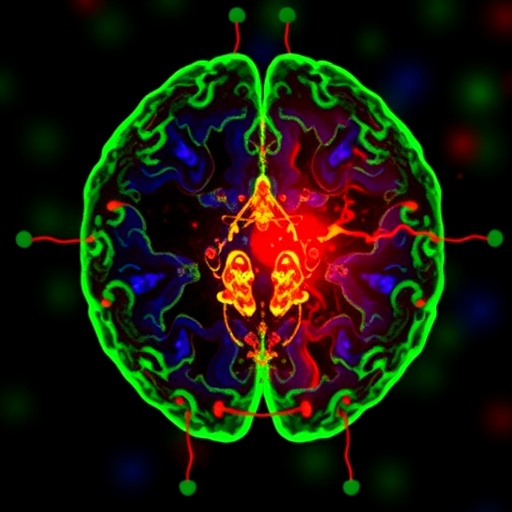Recent research has unveiled critical insights into the sex differences in the microglial response to stress and chronic alcohol exposure, with significant implications for understanding neurobiology and potential treatment approaches. The study, conducted by a team led by A.R. Soares and colleagues, meticulously examines how male and female mice exhibit distinctive microglial behaviors when subjected to environmental stressors and the prolonged effects of ethanol. These findings not only contribute to the existing body of knowledge on neuroinflammation but also raise questions regarding sex-specific susceptibilities to neurodegenerative diseases.
Microglia, the resident immune cells of the central nervous system, play a crucial role in maintaining brain homeostasis. They are highly adaptable cells capable of responding to various stimuli, including injury, infection, and inflammation. In the context of stress and alcohol exposure, microglial activation can have profound effects on neuronal health and overall brain function. Understanding the nuances of this activation in relation to sex differences is paramount, as it may lead to tailored therapeutic strategies for men and women.
In their groundbreaking study, the researchers employed a comprehensive approach to quantify microglial activation in both male and female mice. Utilizing advanced imaging techniques and immunohistochemical staining, they were able to visualize and assess changes in microglial morphology and activity in response to chronic stressors and alcohol consumption. The level of detail achieved in this study highlights the importance of methodological rigor in neurobiological research, ensuring that results are robust and reliable.
One of the notable findings of the study is the differential activation patterns observed between male and female mice. Male mice displayed a more pronounced microglial activation, characterized by increased cell proliferation and altered morphology when exposed to chronic stress and alcohol. In contrast, female mice showed a relatively subdued microglial response under similar conditions. This divergence suggests that the underlying mechanisms of stress and alcohol-induced neuroinflammation may be fundamentally different between the sexes, underlining the necessity for further investigations into these pathways.
Moreover, the implications of these sex-specific responses could extend beyond the laboratory. As chronic stress and alcohol use are significant public health concerns, understanding the biological underpinnings behind these behaviors may inform preventive measures and treatment protocols. For instance, male individuals may require more aggressive interventions when dealing with stress-related disorders or substance use, as their neuroimmune response may predispose them to increased risk for neuropsychiatric conditions.
The behavioral outcomes associated with microglial activation are also worth noting. The study observed an array of cognitive and emotional changes in mice subjected to chronic alcohol and stress exposure, including increased anxiety-like behaviors and impaired cognitive function. These findings suggest that the activation state of microglia contributes to the overall behavioral phenotype, reinforcing the notion that immune responses in the brain can dictate psychological and cognitive health.
As the authors delve deeper into the molecular mechanisms underlying these observations, they highlight the importance of sex hormones in modulating microglial function. Estrogen and testosterone have been implicated in influencing microglial activation, with estrogen generally promoting a neuroprotective microglial state. This hormonal modulation may explain some of the observed differences in microglial responses to stress and alcohol exposure, paving the way for future studies to explore hormonal influences in greater detail.
Furthermore, the research sets the stage for understanding the potential long-term implications of altered microglial activity in the context of chronic alcohol use. Prolonged microglial activation is associated with neurodegenerative diseases such as Alzheimer’s and Parkinson’s. If male and female brains respond differently to stress and alcohol, this may lead to differentiated pathways of neurodegeneration, necessitating distinct approaches for prevention and treatment that consider these biological differences.
In summary, the findings presented by Soares et al. illuminate the complex interplay between sex, stress, and alcohol exposure on microglial responses in mice. The study significantly enhances our understanding of neuroimmunology, particularly in the context of sex differences, which have often been overlooked in past research. As the field of neuroscience continues to evolve, embracing these complexities will be essential for developing effective interventions that markedly improve mental health outcomes for all individuals.
The results of this research are poised to spark further investigations aimed at elucidating the detailed molecular signaling pathways that drive these sex differences in microglial responses. Research focused on translating these findings into clinical practice could lead to a new frontier in neuropsychopharmacology, where therapies are designed with an awareness of sex-specific biological responses. The growing body of evidence suggests a pressing need for personalized medicine approaches in psychiatric and neurodegenerative disorders, particularly for conditions related to stress and substance use.
Ultimately, this research highlights the necessity of integrating sex as a biological variable in preclinical and clinical studies, thereby ensuring that future investigations and therapeutic developments are relevant and effective for everyone. Building upon these findings will not only enhance the scientific understanding of the brain’s immune responses but also pave the way for groundbreaking advancements in treating stress-related disorders and substance abuse across diverse populations.
Subject of Research: Sex differences in microglial response to stress and chronic alcohol exposure in mice.
Article Title: Sex differences in the microglial response to stress and chronic alcohol exposure in mice.
Article References:
Soares, A.R., Garcia-Rivas, V., Fai, C. et al. Sex differences in the microglial response to stress and chronic alcohol exposure in mice. Biol Sex Differ 16, 19 (2025). https://doi.org/10.1186/s13293-025-00701-y
Image Credits: AI Generated
DOI: 10.1186/s13293-025-00701-y
Keywords: Microglia, Sex Differences, Chronic Stress, Alcohol Exposure, Neuroinflammation, Neurodegeneration, Cognitive Function, Estrogen, Testosterone.




